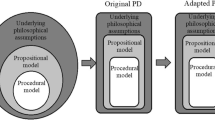Abstract
This essay reflects on the challenges of thinking about scale—of making sense of phenomena such as continuous professional development (CPD) at the system level, while holding on to detail at the finer grain size(s) of implementation. The stimuli for my reflections are three diverse studies of attempts at scale—an attempt to use ideas related to professional development in two different countries, the story of how research did or did not frame a nationwide attempt at undergirding CPD, and a fine-grained study of the quality of a dozen mentors’ implementation of CPD. The challenge is to “see the forest for the trees,” to be able to situate such diverse studies within a larger framework. The bulk of this article is devoted to offering such a framework, the teaching for robust understanding (TRU) framework, which characterizes five fundamentally important dimensions of powerful learning environments. At the most fine-grained level, TRU applies to classrooms, establishing goals for instruction. But, more generally, it applies to all learning environments, and this characterizes important aspects of CPD. The TRU framework thus provides a unifying frame within which one can situate the studies in this volume.



Similar content being viewed by others
References
Baldinger, E., & Louie, N. (2014). TRU Math conversation guide: A tool for teacher learning and growth. Berkeley, CA & E. Lansing, MI: Graduate School of Education, University of California, Berkeley & College of Education, Michigan State University. Retrieved 1 Jan 2014 http://ats.berkeley.edu/tools.html and http://map.mathshell.org/materials/pd.php.
Boesen, J., Helenius, O., & Johansson, B. (2015). National-scale professional development in Sweden: theory, policy, practice. ZDM - Mathematics Education, 47(1). doi:10.1007/s11858-014-0653-4 (this issue).
Bransford, J., Brown, A., & Cocking, R. (2000). How people learn (expanded edition). Washington, DC: National Academy Press.
Clark-Wilson, A., Hoyles, C., Noss, R., Vahey, P., & Roschelle, J. (2015). Scaling a technology-based innovation: windows on the evolution of mathematics teachers’ practices. ZDM - Mathematics Education, 47(1). doi:10.1007/s11858-014-0635-6 (this issue).
Eisenhart, M., Borko, H., Underhill, R., Brown, C., Jones, D., & Agard, P. (1993). Conceptual knowledge falls through the cracks: complexities of learning to teach mathematics for understanding. Journal for Research in Mathematics Education, 24, 8–40.
Fernandez, C., & Yoshida, M. (2004). Lesson study: a Japanese approach to improving mathematics teaching and learning. Mahwah: Erlbaum.
Kilpatrick, J., Swafford, J., & Findell, B. (Eds.). (2001). Adding it up: helping children learn mathematics. Washington, DC: National Academy Press.
Kuzle, A., & Biehler, R. (2015). Examining mathematics mentor teachers’ practices in professional development courses on teaching data analysis: Implications for mentor teachers’ programs. ZDM - Mathematics Education, 47(1). doi:10.1007/s11858-014-0663-2 (this issue).
Lewis, C., Perry, R., Friedkin, S., Fisher, L., Disston, J., & Foster, D. (2012). Building knowledge and professional community through lesson study. In J. M. Bay-Wiliams & W. Speer (Eds.), 74th NCTM Yearbook (2012) (pp. 245–258). Reston: National Council of Teachers of Mathematics.
Lewis, C., Perry, R., & Hurd, J. (2009). Improving mathematics instruction through lesson study: a theoretical model and North American case. Journal of Mathematics Teacher Education, 12(4), 285–304.
Lortie, D. C. (1975). Schoolteacher: a sociological study. Chicago: University of Chicago Press.
Schoenfeld, A. H. (1985). Mathematical problem solving. Orlando: Academic Press.
Schoenfeld, A. H. (2003). How can we examine the connections between teachers’ world views and their educational practices? Issues in Education, 8(2), 217–227.
Schoenfeld, A.H. (2013). Classroom observations in theory and practice. ZDM - the International Journal of Mathematics Education, 45, 6-7-621. doi:10.1007/s11858-012-0483-1.
Schoenfeld, A. H. (2014). November). What makes for powerful classrooms, and how can we support teachers in creating them? Educational Researcher, 43(8), 404–412. doi:10.3102/0013189X1455.
Schoenfeld, A. H., Floden, R. E., & the Algebra Teaching Study and Mathematics Assessment Project. (2014a). An introduction to the TRU Math dimensions. Berkeley, CA & E. Lansing, MI: Graduate School of Education, University of California, Berkeley & College of Education, Michigan State University. Retrieved from: http://ats.berkeley.edu/tools.html and/or http://map.mathshell.org/materials/pd.php.
Schoenfeld, A. H., Floden, R. E., & the Algebra Teaching Study and Mathematics Assessment Project. (2014b). The TRU Math Scoring Rubric. Berkeley, CA & E. Lansing, MI: Graduate School of Education, University of California, Berkeley & College of Education, Michigan State University. Retrieved from http://ats.berkeley.edu/tools.html.
Schoenfeld, A. H., & Kilpatrick, J. (2008). Toward a theory of proficiency in teaching mathematics. In D. Tirosh & T. Wood (Eds.), International handbook of mathematics teacher education, volume 2: tools and processes in mathematics teacher education (pp. 321–354). Rotterdam: Sense Publishers.
Acknowledgments
This paper is grounded in work supported by the National Science Foundation (The Algebra Teaching Study, Grant DRL-0909815), to Alan Schoenfeld and Robert Floden, and the Bill and Melinda Gates Foundation (The Mathematics Assessment Project, Grant OPP53342). My thanks to Nicole Louie for her helpful comments on an earlier draft of this article.
Author information
Authors and Affiliations
Corresponding author
Rights and permissions
About this article
Cite this article
Schoenfeld, A.H. Thoughts on scale. ZDM Mathematics Education 47, 161–169 (2015). https://doi.org/10.1007/s11858-014-0662-3
Accepted:
Published:
Issue Date:
DOI: https://doi.org/10.1007/s11858-014-0662-3




